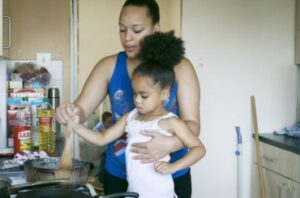BORN TO READ
Javed Fiyaz Foundation with Save the Children
Online PDF
The Need

Children born into poverty are half as likely to do as well at school as their wealthier friends. In Britain today, one of the richest countries in the world, very young children still fall behind and stay behind at school, with the education gap starting from birth and evident as early as 19 months.
As a result, 80% of a child’s GCSE results are determined by the time they are seven. Seven is just the beginning of formal education but it is almost too late for a fair chance in life for too many children.
Southwark is an inner London borough which is characterised by high levels of deprivation, interspersed with pockets of affluence.
24% of children in Southwark are living in poverty, with poverty rates in some areas as high as 35% - this is higher than both the London and Uk average. A high proportion of Southwark's residents currently receive out-of-work benefits and those parents who do work are in either low paid or insecure jobs, which impacts on their children's chances to reach their full potential.
Project annual structure:
- Year one: January - December 2013.
- Year two: January - December 2014
- Year three: January - December 2015
The project aims to contribute to helping young children in Southwark to overcome the effects of poverty at critical times in their development.
Through a multi-programme approach, the project will strengthen the relationship with local services and community groups in Southwark, offering children and their families access to three of our programmes as a package: Eat, Sleep, Learn, Plan!(ESLP!); Families and Schools Together (FAST); and Born to Read.
Because of the JFCT, Save the Children have been able to deliver a package of programmes to disadvantaged families, some highlights of year one include:
- Building strong relationships with local authority partners who are instrumental in delivering our programmes.
- Training 90 local professionals across a range of sectors who are now able to act as Eat, Sleep, Learn, Play!(ESLP!) referral partners, helping us reach the most vulnerable children.
- Providing 250 disadvantaged families with essential household items through ESLP!, improving the life chances of up to 550 children. Our funding has directly supported 121 of these families.
- delivering Families and Schools Together in two schools, benefiting 53 children and 25 parents.
- Training a Local Authority staff member as a FAST train.
- Successfully established Born to Read in Southwark, engaging five new schools and initiating delivery in two of them.
- Réalisation du programme Families and Schools Together dans deux écoles, au profit de 53 enfants et 25 parents.
- Formation d'un agent de la collectivité locale au programme FAST.
- Introduction réussie du programme Born to Read à Southwark, suscitant l'adhésion de cinq nouvelles écoles dont deux l'ont déjà mis en œuvre.
How have we fulfilled our objectives
Eat, Sleep, Learn, Play! (ESLP) is our early-intervention grants programme that supports deprived families with young children by providing essential household items. These items improve children’s health and well-being, their ability to learn and develop in the long term, and reduce financial pressures in the home, family stress and poor mental health.
ESLP! has changed the lives of the families receiving our household grants. We awarded over 1,200 essential household items, meeting the immediate needs of local families as well as creating long-term positive change for children. Items included:
-
- 246 beds, allowing children to get a good night’s sleep so they wake up ready to learn
-
- 62 highchairs and 73 cookers, improving eating habits and helping to establish a routine for young children
-
- 160 pushchairs, allowing families to take young children outside safely and enabling parents to access services in their local community
- 116 toy-and-book packs, providing children with age-related learning activities, giving them physical and mental stimulation, which aids their development.

